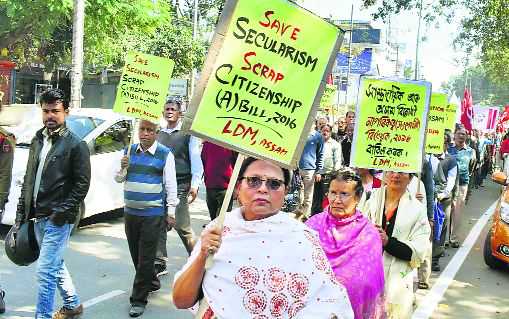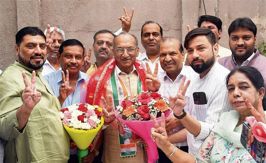
Targeted: Be it the National Register of Citizens or the attacks on innocent Kashmiris, the question of ‘identity’ is doing the rounds.
Shiv Visvanathan
Academic associated with Compost Heap
One of the most sacrosanct terms within a modern democracy is not the idea of a nation state, or rights, or the rituals of voting but the existence of citizenship. Citizenship as an idea has become arid because it projects a process of certification, an act of clerical labelling where we forget that it is a festival of homecoming, a claim to have a home and right to determine the idea of one. It creates an ontology of being, a sense of no longer being alien, of being confronted as an outsider. The rituals of incorporating someone as a citizenship are an empowering act. Democracy choreographs the varieties of empowerment. Nineteenth and 21st century democracy enacted out the drama of citizenship between refugee, exile, and migrant. The drama of incorporating these three liminal worlds often produced the creation myths of democracy.
Yet of late, democracy has taken a strange turn and its citizens, along with a security-oriented state, are whittling away at the idea of citizenship. What was once a celebration of diversity has become a self-conscious whittling away of the richness of citizenship. It is a world eating into itself.
One can understand this by looking at a shopping list of citizenship. It provides a home, a sense of residence, a certificate of identity, a feeling of being and continuity and sense of membership in a locality. One can dismiss these as bourgeois demands, but bourgeois requirements also embody a sense of the human and the universal. Safety, security, and sustainability become the hallmarks of citizenship and it is precisely this which we have impoverished over the past two years of the Modi regime.
A litany of anecdotes can capture this impoverishment of citizenship. As one sifts through the archive of suspicion and hostility one realises that the so-called citizen secure in his identity can disappear into a parallel world of the alien, the stranger, the homeless, the doubly displaced refugee and the nomad. It is almost as if some statuses, some claims to the legacy of citizenship are less equal than others. Sadly, it reveals that citizenship has lost its bourgeois certainty and become an Orwellian world of anxiety, loss and futility. The example is recounted in every newspaper, but there is no attempt to connect the dots and read the social message of the patterns.
After the Pulwama tragedy, an epidemic of jingoism has spread across India. A Kashmiri shawl seller was thrown off a train. He, like the Tibetan selling sweaters, is a ubiquitous presence in winter. Yet, the Kashmiri seller, part of the everyday economy, is stigmatised as suspect. From a welcome salesman, he becomes a security threat. An individual, who has no connection with war, is struck off the imaginary list of citizenship. Here, ordinary citizens are witch-hunting and carrying out inquisitions as part of the rituals of civic life. Murder is written off as collateral damage. The poignancy of the shawl seller is replicated by threats as a Kashmiri doctor, who has lived for decades in Kolkata, is suddenly turned suspect and non-citizen. Vigilante mobs have been taking over the custodianship of citizenship and transforming it from rights of inclusion to rites of exclusion.
The case of the citizens’ register in Assam provides another epidemic of horror stories. Here, the national register, rather than assuring citizenship, triggers leakages around certificates. The clerk becomes the sovereign of the citizen’s fate and no assurances that one has stayed for decades helps. A certificate as testimony becomes more a modus operandi for exclusion rather than incorporation. Worse, the government skews the possibilities by contending that Hindus and Sikhs subject to persecution deserve preference. The Bengali Muslim loses out in this battle to the Bengali Hindu. Suffering, which once had a secular, humanitarian frame, now becomes an occasion for bias. All these issues disappear in the confusion of the great census read of a technical act of governance. There is little attempt to read the census as a discourse of violence. Worse, the power of electoral politics creates anxieties in numerically marginal groups, inducing protests which rarely command attention. Finally, one faces the prospect, after all the intricacies of the survey, that India might have to intern four million people in refugee camps as beings who do not belong to the other side of the border.
The typical citizen is someone who lives within the formal economics and politics of civics. But such civics is becoming exclusive in its availability. The tribal way of life leads to a lesser form of citizenship. A tribal without the sustaining power of nature is already impoverished. Robbed of his access to oral language, he becomes vulnerable but when the court in a surreal judgment denies him the right to his forests, it emasculates his citizenship and denies him the entitlement to his knowledge system.
Beyond the indifference of governance, the idea of our citizenship is being caught in the cross hairs of the natural security state, the development debate, the battle between ecologism and human rights, and worse in a huge world of anxieties created by majoritarianism, where electoral democracy becomes a threat to plural democracy. The problem is few scholars or activists are connecting this quilt patch of incidents to reveal a denudation of rights. We legitimise ourselves by arguing that identity politics is destroying democracy everywhere. But that is little consolation to the abandoned citizen stigmatised for being nomadic, homeless, suspect or different. The need is to reinvent citizenship beyond its 19th-century developments, hospitality and compassion. Solidarity must once again inform the reinvention of citizenship. Otherwise, vulnerability might become the fate of a majority of our people.



























